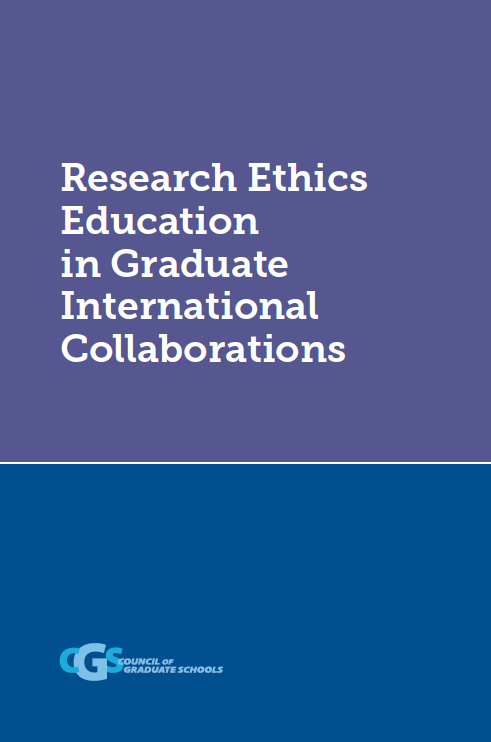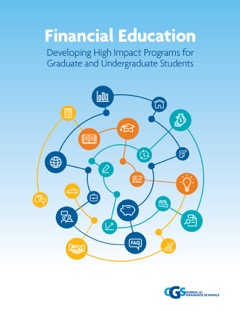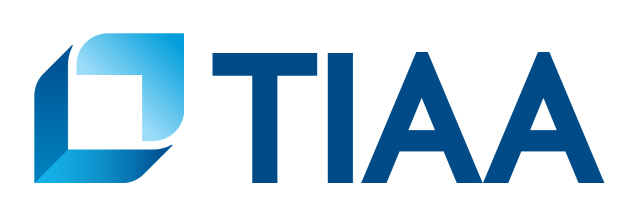You are on CGS' Legacy Site.
Thank you for visiting CGS! You are currently using CGS' legacy site, which is no longer supported. For up-to-date information, including publications purchasing and meeting information, please visit cgsnet.org.
Rotating Image
Contacts:
Julia Kent, CGS
(202) 223-3791 / jkent@cgs.nche.edu
Washington, DC — The Council of Graduate Schools (CGS) has announced that Robert M. (Bob) Augustine, Dean of the Graduate School, Research and International Programs at Eastern Illinois University (EIU), has been appointed to a two-year term as the Council’s Senior Vice President. In addition to serving two terms as President of the Illinois Association of Graduate Schools, Augustine served on the CGS Board of Directors from 2011 to 2014 and held the position of Board Chair in 2013. He will join CGS on August 1, 2015.
The newly created Senior Vice President’s role will expand the services that CGS provides to master’s-focused institutions. Working with colleagues in CGS’s Best Practices division, Augustine will be responsible for developing an infrastructure for research on issues related to the master’s degree and for delivering programs relevant to the needs of master’s-focused institutions. He will also be responsible for the management and convening of the CGS Master’s Committee.
“For a number of years now, Bob Augustine has shared his deep knowledge of trends in master’s education with CGS members through board service and voluntary leadership roles in CGS meetings,” said CGS President Suzanne T. Ortega. “I am delighted that he will be extending his impact in this important area, and in graduate education more broadly, as a member of CGS’s leadership staff.”
Augustine will bring to CGS diverse experience in developing best practices for serving master’s degree students. During his tenure as graduate dean, EIU’s graduate school earned the ETS/Midwestern Association of Graduate School’s Award for Excellence in Graduate Education for the First Choice Graduate Programs Initiative. His institution was also awarded the ETS/CGS Award for Promoting Success in Graduate Education for developing the Integrative Graduate Studies Institute, as well as the CGS/TIAA-CREF Award for Enhancing Financial Literacy, which allowed EIU to launch a center devoted to Literacy in Financial Education.
Commenting on the appointment, Augustine said, “I am energized by this fantastic opportunity to contribute to the mission and values of the graduate community through the work of the Council of Graduate Schools. I look forward to advancing my new priorities as Senior Vice President.”
Augustine holds a PhD in communication sciences and disorders from Southern Illinois University at Carbondale, where he earned a Department Distinguished Alumni Award. Following clinical experience in speech-language pathology, he launched an early intervention language clinic focusing on integrative language strategies at EIU. Augustine guided expansion of the program, launched the first technology-enhanced courses, and developed the program’s first international outreach efforts before becoming Dean of the EIU Graduate School in 2000.
The Council of Graduate Schools (CGS) is an organization of over 500 institutions of higher education in the United States and Canada engaged in graduate education, research, and the preparation of candidates for advanced degrees. Among U.S. institutions, CGS members award 91% of the doctoral degrees and 81% of the master’s degrees.* The organization’s mission is to improve and advance graduate education, which it accomplishes through advocacy in the federal policy arena, research, and the development and dissemination of best practices.
* Based on data from the 2013 CGS/GRE Survey of Graduate Enrollment and Degrees.
Today’s graduate and undergraduate students are in a much different place financially than previous generations of students. In 2012, total student debt for the first time exceeded $1 trillion and is now over $1.3 trillion. Rising debt levels can cause some students to defer graduate study or to decide that a graduate degree is not for them. At a time when public funding for education is decreasing and student debt is rising, more students are taking on debt to support their educational aspirations.
To help students learn how to successfully manage their finances and educational costs, the Council of Graduate Schools, funded by a grant from TIAA, a leading financial services organization with a long history of serving those in the academic, research, medical and cultural fields, launched a three-year project to enhance the financial literacy of graduate and undergraduate students.
Project Goals
Participating colleges and universities designed programs that prepare students to play an active role in managing their personal finances and making informed decisions about saving, spending, and borrowing. The institutions addressed the needs of different groups of students, while considering factors such as their field of study, degree levels, and chosen career pathways, each of which has significant financial ramifications. CGS and partnering institutions collected and analyzed data to inform the development of innovative, new tools and resources for students.
Key lessons and data from this groundbreaking program are available in the report: “Financial Education: Developing High Impact Programs for Graduate and Undergraduate Students,” available in PDF and at studentfinancialsuccess.org. Through this initiative, CGS and partnering universities developed and delivered high quality financial literacy programs, assessed the impact of those programs, and documented best practices. Financial Education illustrates these efforts in-depth and provides diverse and innovative models and practical resources for helping produce and shape effective student financial education programs. This book will be of particular interest to graduate deans, financial aid officers, program directors, and faculty who are interested in understanding the financial circumstances and meeting the needs of today’s graduate students. Hard copies of this report are available to CGS members and non-members for purchase here.
GradSense
CGS has developed GradSense.org, a unique online education platform that provides students with financial information about a range of topics including the value of pursuing an advanced degree. Through interactive visualization tools and engaging infographics, we invite students to better understand a variety of issues related to borrowing and spending, potential future earnings, and money management.
To integrate GradSense and related resources into your webpages, click here.
Online Resource Library
CGS has compiled helpful resources and tools for institutions, deans, and program directors seeking to prepare students for managing their personal finances and making informed decisions about saving, spending, and borrowing.
Research Partners
Through a competitive proposal process involving an independent selection committee, 15 institutions were selected and participated in the project as funded research partners. The institutions selected were:
- Arkansas State University
- Cornell University
- The Ohio State University
- University of Colorado System
- Eastern Illinois University
- Florida A&M University
- Iowa State University
- Kansas State University
- Loyola University Chicago
- Mississippi State University
- University of Illinois at Urbana-Champaign
- University of Kentucky
- University of Maryland, Baltimore County
- University of South Florida
- Winthrop University
An additional 19 universities participated in the project as affiliate partners.
Contacts
In collaboration with:
Nominations for the 2022 award should be submitted by April 29th.
Named in honor of the first president of the Council of Graduate Schools and first presented in 1972, this award is made annually to a scholar-teacher in the humanities.
The recipient must be teaching at a U.S. or Canadian university, have earned a doctorate within 7 years of the award date, and have written a book of scholarly importance in that same timeframe. Subjects fields are selected annually. Awards have been made in literature, history, linguistics, foreign languages, philosophy, archaeology, and musicology.
Important Guidance on Field Eligibility:
Your university is welcome to submit a nomination that is interdisciplinary, so long as the book draws heavily from the methods and scholarship of the current year's field of competition Religious Studies. Since CGS is not in a position to advise you on the eligibility of particular works of scholarship, it is up to your institution to determine whether the book sufficiently meets this criterion, and with the understanding that your nomination will be evaluated alongside other books in the field of competition.
Current Year Award Description
Contact
Attendees at the CGS 54th Annual Meeting in Washington, DC, enjoyed engaging sessions, terrific speakers and exciting networking. Flip through this gallery of for an overview of meeting highlights. (More photos coming soon.)
The ability to resolve ethical issues that arise in international research is critical to the success of U.S.-trained scientists and engineers. It is also essential to ensuring the integrity of U.S. research with international partners. With funding from the National Science Foundation (NSF #1135345), CGS completed a three-year, collaborative project to develop accessible and replicable models for preparing STEM researchers to navigate ethical challenges in international research collaborations.
Project Goals
- Identify and test learning outcomes for research ethics education in international collaborations
- Document approaches to using those outcomes to enhance the preparation of STEM graduate students
- Develop case studies based on successful programs and an online repository of graduate learning outcomes
Project Outcomes

Research Ethics Education in Graduate International Collaborations
Online Repository: Learning Outcomes & Assessment Tools
Research Partners
Through a competitive process, the following institutions were selected to participate in the project as funded research partners:
An additional six universities participated as affiliate partners:
- Drexel University
- Indiana University
- Loyola University Chicago
- Mississippi State University
- North Carolina A&T University
- Purdue University
Additional Resources
More information about the project goals and background can be found in a CGS Framework Paper written to guide the development of proposals.
Contact
Supported by a grant from the National Science Foundation (NSF #1135345)
Contacts:
Julia Kent, CGS: (202) 223-3791 / jkent@cgs.nche.edu
Barri Bronston, Tulane University: 504.314.7444 / bbronst@tulane.edu
New Orleans and Washington, DC — The Council of Graduate Schools (CGS) has announced that Brian S. Mitchell, Professor of Chemical and Biomolecular Engineering at Tulane University, has been named the Council of Graduate Schools/National Science Foundation Dean-in-Residence for 2015-16. Dr. Mitchell brings to the post significant experience leading graduate education at his home university, having served as Tulane’s Associate Provost for Graduate Studies and Research from 2006 to 2014. Mitchell will join CGS on February 1.
The Dean-in-Residence program was created by CGS and the National Science Foundation (NSF) to support communications between senior graduate education leaders and the NSF. In this role, Mitchell will share with CGS and NSF the insights, perspectives, and practical experience of a senior administrator at a research university, while collaborating with program officers and senior administrators across NSF to help plan future NSF programs and activities.
“Dr. Mitchell’s experience in graduate education is both broad and deep,” said CGS President Suzanne T. Ortega. “His particular experience establishing interdisciplinary graduate programs, collaborating on international research projects, and overseeing the training of graduate teaching assistants are just a few of the areas where he will be able to facilitate communication between CGS member institutions and NSF.”
In accepting the appointment, Mitchell stated that he looks forward to collaborating with NSF and CGS on important issues in graduate education.
"NSF has not only been a leader in supporting graduate student training, but in shaping the content of those students' professional development,” Mitchell said. “From innovative training programs to international research experiences, their leadership has been a critical component of enhancing graduate education. Similarly, CGS is the established leader in evaluating trends in graduate education and advocating on its behalf. My goal as Dean-in-Residence is to not only support those ongoing activities, but to explore innovative ways to document and demonstrate the positive societal and global impact that graduate education has, not only in the STEM and related fields, but in all scholarly and creative disciplines."
After receiving his PhD in chemical engineering from the University of Wisconsin-Madison (1991), Mitchell conducted research in numerous positions, including an NSF-NATO postdoctoral fellowship at the University Karlsruhe and Alexander von Humboldt Research Fellowships at the German Aerospace Agency and the Max Planck Institute for Colloids and Interfaces. His primary research areas of interest are nanostructured materials and materials processing.
In addition to his research experience, Mitchell has been a national and international speaker on issues in research and graduate education. His public service in STEM education has included frequent presentations to Louisiana elementary school children through the state’s “Speaking of Science” program.
About CGS
The Council of Graduate Schools (CGS) is an organization of over 500 institutions of higher education in the United States and Canada engaged in graduate education, research, and the preparation of candidates for advanced degrees. Among U.S. institutions, CGS members award 91% of the doctoral degrees and 81% of the master’s degrees.* The organization’s mission is to improve and advance graduate education, which it accomplishes through advocacy in the federal policy arena, research, and the development and dissemination of best practices.
* Based on data from the 2013 CGS/GRE Survey of Graduate Enrollment and Degrees.
About the Tulane University School of Science and Engineering
The Tulane University School of Science and Engineering combines the very best of a top tier research university with a strong commitment to high quality undergraduate education. The rich tradition of excellence, the interdisciplinary intellectual environment, the personal attention to students at all levels, and the setting in picturesque New Orleans make the Tulane School of Science and Engineering a truly exceptional experience.
The School of Science and Engineering offers degree programs at the undergraduate and graduate levels that span the biological sciences, the physical sciences, the behavioral sciences, mathematics, engineering, and computer science. Currently, the School enrolls 1737 full-time undergraduates, 127 master students, and 346 doctoral students. The regular faculty of the School consists of 119 tenure stream faculty, 32 professors of the practice, and 14 research professors. Of the tenure stream faculty, 13 hold Endowed Chair positions, 10 hold Endowed Professorship positions, and 6 hold Endowed Early Career Professor positions. The School is comprised of 14 facilities located on the Uptown New Orleans, Downtown New Orleans, and Riverside Campuses. School of Science and Engineering faculty members are affiliated with 9 Tulane University research centers. For more information about the Tulane School of Science and Engineering, please visit our website at http://tulane.edu/sse/.
At the CGS 54th Annual Meeting, December 3-6, 2014 in Washington, DC, attendees enjoyed engaging sessions, terrific speakers and exciting networking. We've recapped several plenary sessions below for an engaging look through audience tweets and photos. Explore #CGS54 conversations in Storify, and keep in touch with CGS on Twitter and Facebook!
As an influential leader in higher education and former White House cabinet official, University of California System President Janet Napolitano joined attendees to discuss the trends, challenges and opportunities in graduate education. She urged deans and graduate leaders to "make the case" for education and research, calling for greater interaction with the public and policy makers to ensure the graduate enterprise is meeting America's needs.
National Science Foundation (NSF) Director France Cordova shared updates and perspectives on the NSF role in supporting a diverse, high quality science and engineering workforce. Cordova pointed to reframing grad ed to meet the needs of society and of students, and introduced an online forum NSF is using to gather feedback from its stakeholders.
TIAA-CREF chief executive and Federal Reserve Bank alumnus Roger Ferguson shared a view of graduate education from the Fortune 100, emphasizing that partnerships between the academy, business, and government can make a positive difference for students, institutions and society.
Stan Collender, nationally-renowned expert on the federal budget process, shared insights on the current budgeting climate and offered predictions on spending decisions, economic conditions, and fiscal and monetary policies affecting graduate education during the 114th Congress and beyond.
Graduate scholars make incredible contributions of new knowledge every year. The CGS Annual Meeting showcases a few of the very best breakthroughs in the form of dissertations, publications, and new innovations by graduate schools and administrators to promote student success. Awardees for 2014 pushed forward epistemological inquiry, demonstrated the first ever quantum error correction in a solid-state device, found new ways to measure the resolve of powers in international conflicts, and empowered graduate students to set their own agendas for professional development.







